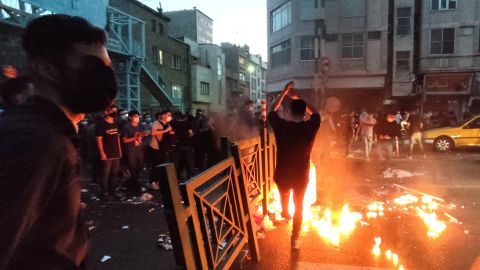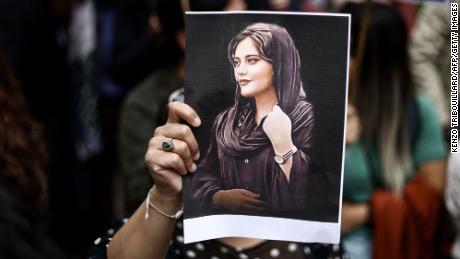Young Iranians are rising up against decades of repression – arguably bolder than ever
Iranian authorities say they will restrict internet access in the country until calm is restored to the streets, as protests over the death of a young woman in the custody of the morality police rock the Islamic Republic.
Thousands of Iranians have taken to the streets in protest since the death last week of 22-year-old Mahsa Amini, who was apprehended in Tehran and taken to a “re-education center,” apparently for not wearing her hijab properly.
Since Friday, demonstrations have taken place in at least 40 cities nationwide, including the capital Tehran, with protesters demanding an end to violence and discrimination against women as well as an end to compulsory wearing of the hijab.
Dozens of protesters have reportedly been killed in the resulting clashes with security forces.
CNN cannot independently verify the death toll – a precise figure is impossible for anyone outside the Iranian government to confirm – and different estimates have been given by opposition groups, international rights organizations and local journalists. Amnesty International said Friday that at least 30 people, including four children, had died; according to state media the Islamic Republic of Iran Broadcasting, 35 people have died.

Decades of repression
Authorities hope that by restricting the internet they can control the protests – the latest in a wave that has swept Iran in recent years. They started with the Green movement in 2009 over contested election results and more recently the 2019 protests sparked by a rise in fuel prices. Hundreds were believed to have been killed in the violent crackdown three years ago and thousands injured, according to estimates released by the UN and rights groups.
But this year’s protests are different – in their scope, scale and unprecedented feminist nature. There is also mobilization across the socio-economic divide. A young generation of Iranians are rising up on the streets against decades of repression – arguably bolder than ever.
The demonstrations have spread to dozens of Iranian cities, from the Kurdish region in the northwest, to the capital Tehran and even more traditionally conservative cities like Mashhad.
While they were ignited by the death of Amini – the initial calls for accountability have turned into demands for more rights and freedoms, especially for women who for decades since the 1979 Islamic Revolution have faced discrimination and severe restrictions on their rights.
‘I’m frightened’: Women open up about Iran’s hijab law following police custody death
But calls for regime change are growing too. People across the country are chanting for “death to the dictator,” in a reference to the Supreme Leader, tearing down portraits of Ayatollah Ali Khamenei. Remarkable images emerged on Friday night from Khamenei’s birthplace in the city of Mashhad, where protesters set fire to the statue of a man considered one of the symbols of the Islamic Revolution. Such scenes were unthinkable in the past.
This is all happening at a time when Iran’s hardline leadership is under growing pressure with talks to revive the stalled 2015 nuclear agreement and the state of the economy under US sanctions; ordinary Iranians are struggling to cope with soaring levels of inflation.
While these protests are the biggest challenge for the government for years, analysts believe the government will likely move to contain them by resorting to the heavy-handed tactics it has used in the past. There are signs a brutal crackdown is coming, along with the internet restrictions on a level not seen since 2019. Other measures include the government mobilizing its supporters in mass rallies following Friday prayers; officials dismissing the demonstrators as rioters and foreign agents, and ominous warnings the army and powerful Iranian Revolutionary Guard Corps will be deployed to deal



